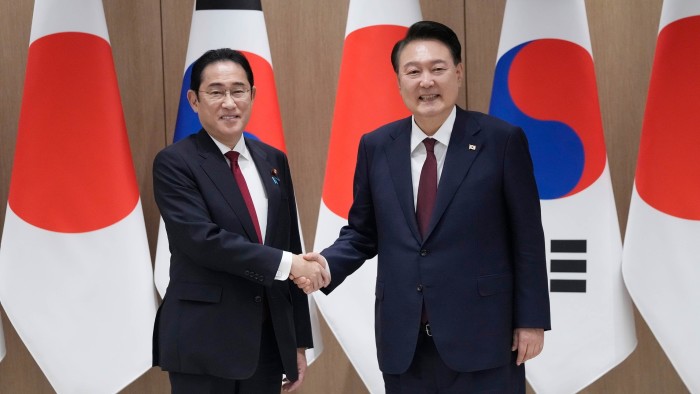
South Korea and Japan criticised for approach to climate collaboration
Financial Times
Following a historic thaw in relations that has led to a deepening of military ties between South Korea and Japan, the two countries are targeting a new area of collaboration: climate and energy security.
Their governments are stepping up efforts to promote the use of hydrogen and ammonia as emission reduction tools for their industrial and power generation sectors. But the bilateral effort has been heavily criticised by environmental campaigners, who argue it could slow the global transition to renewable energy.
In a meeting in Seoul last month, Japanese prime minister Fumio Kishida and South Korean president Yoon Suk Yeol agreed to accelerate efforts to create a global supply chain for hydrogen and ammonia after unveiling the joint initiative last November.
Japan, which released the world’s first national hydrogen strategy in 2017, wants to use the gas as a “low-carbon” fuel, while Seoul has also set ambitious hydrogen targets, aiming to use it to meet a third of its energy needs by 2050.
Both countries are also promoting ammonia, a compound of hydrogen and nitrogen often used to make fertilisers, as a fuel in coal-fired power stations — to reduce their emissions and extend their operational lives.
“Japan and South Korea have similar challenges in terms of achieving energy security and clean energy, so there is much room for the two countries to co-operate,” says Noriyuki Shikata, Japan’s cabinet secretary for public affairs.
Neither hydrogen nor ammonia, when burnt, generates “end-use emissions” of carbon. But their production is highly energy intensive and environmentalists say neither country’s plan to expand renewable energy generation capacity is ambitious enough to remove carbon emissions from the process.
South Korean president Yoon Suk Yeol (right) and Japanese prime minister Fumio Kishida in Seoul in May © Ahn Young-Joon – Pool/Getty Images
Japan plans to generate up to 38 per cent of its electricity from renewables by 2030, compared with 22 per cent last year and an OECD average of 26 per cent. South Korea, where renewables account for just 7.7 per cent of electricity, last year cut its 2030 renewables target from 30.2 per cent to 21.6 per cent.
Hydrogen produced using renewable energy is commonly referred to as “green” because the process produces no greenhouse gas emissions. But 90 per cent of the hydrogen produced in South Korea, for example, is so-called “grey hydrogen”, which is made from natural gas, releasing carbon dioxide into the atmosphere.
“Green hydrogen, produced using renewable energy, offers
The full article is available here. This article was published at FT Markets.
Comments are closed for this article!